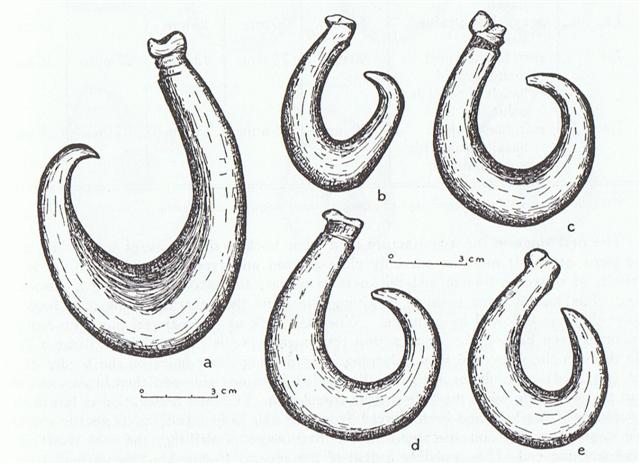Moving ahead from Gb2-20 (275) to Gb5-10
(363) ought to mean advancing 88 right
ascension days; from February 23 (419 = 54)
to 142 (May 22). Precession had carried the
stars ahead from the DECEMBER solstice
(*275) to MARCH 19 (78 = *363). And the
Grape Gatherer (Vindemiatrix) had culminated
here 88 days after Castor had culminated:
|
DEC 18 |
19 (*273) |
20 (354) |
SOLSTICE
(*275) |
 |
 |
 |
 |
|
Gb2-17 |
Gb2-18 |
Gb2-19 |
Gb2-20 (229
+ 46) |
|
... Allen has
documented all his star culminations
at 21h, which could be due to an
effort of keeping the culminations
at their proper places according to
the ancients, 24h (spring equinox) -
21h = 3h = 24h / 8 = 45║. 3h
corresponds to 366 / 8 = 45.75 of my
right ascension days and *366 - *46
= *320 (Dramasa, σ
Octantis) ... |
|
ζ
Cephei (336.2),
λ
Cephei (336.3), -/270 Lac.
(336.7), λ Piscis Austrini (336.8) |
μ
Gruis (337.0),
ε
Cephei (337.2), 1/325 Lac. (337.3),
ANCHA (Hip) =
θ
Aquarii (337.4),
ψ
Oct.
(337.5), α Tucanae (337.9)
*296.0 = *337.4 - *41.4
*337.4 = *169.4 (Coxa, the Hip in
Leo) + *168 |
Al Sa'ad al Ahbiyah-23 (Lucky Star
of Hidden Things) /
Shatabisha-25 (Comprising a Hundred
Physicians)
ε
Oct. (338.1),
ρ
Aquarii
(338.2), 2/365 Lac. (338.5),
SADACHBIA =
γ
Aquarii
(338.6),
π
Gruis (338.9) |
β/172
Lac. (339.2),
4/1100 Lac. (339.4),
π
Aquarii (339.5)
*298.0 = *339.4 - *41.4
CASTOR (α Gemini) |
|
Febr 20 (*336) |
21 (52) |
22 (418) |
Terminalia |
|
... The leap day was introduced as
part of the Julian reform. The day
following the Terminalia (February
23) was doubled, forming the 'bis
sextum - literally 'double
sixth', since February 24 was 'the
sixth day before the Kalends of
March' using Roman inclusive
counting (March 1 was the 'first
day').
Although exceptions exist, the first
day of the bis sextum
(February 24) was usually regarded
as the intercalated or 'bissextile'
day since the third century.
February 29 came to be regarded as
the leap day when the Roman system
of numbering days was replaced by
sequential numbering in the late
Middle Ages ...
|
 |
|
Gb2-21 |
|
|
░Febr 16 (*332) |
17 (48) |
18 (414→ Bharani) |
19 |
|
'Jan 24 |
25 (*310) |
26 |
27 (392) |
|
"Jan 10 (*295) |
11 |
12 |
13 (378
→ Saturn) |
|
... The divine names Bran,
Saturn, Cronos ... are applied to the ghost of
Hercules that floats off in the alder-wood boat
after his
midsummer sacrifice. His
tanist, or other self, appearing in Greek legend
as Poeas who lighted Hercules' pyre and
inherited his arrows, succeeds him for the
second half of the year; having acquired royal
virtue by marriage with the queen, the
representative of the White Goddess, and by
eating some royal part of the dead man's body -
heart, shoulder or thigh-flesh. He is in turn
succeeded by the New Year Hercules, a
reincarnation of the murdered man, who beheads
him and, apparently, eats his head. This
alternate eucharistic sacrifice made royalty
continous, each king in turn the Sun-god beloved
of the reigning Moon-goddess. But when these
cannibalistic rites were abandoned and the
system was gradually modified until a single
king reigned for a term of years,
Saturn-Cronos-Bran became a mere Old Year ghost,
permanently overthrown by Juppiter-Zeus-Belin
though yearly conjured up for placation at the
Saturnalia or Yule feast ...
... That Cronos
the emasculator was deposed by his
son Zeus is an economical statement:
the Achaean herdsmen who on their
arrival in Northern Greece had
identified their Sky-god with the
local oak-hero gained ascendancy
over the Pelasgian agriculturalists.
But there was a compromise between
the two cults. DionŰ, or Diana, of
the woodland was identified with
DanaŰ of the barley; and that an
inconvenient golden sickle, not a
bill-hook of flint or obsidian, was
later used by the Gallic Druids for
lopping the mistletoe, proves that
the oak-ritual had been combined
with that of the barley-king whom
the Goddess DanaŰ, or Alphito, or
Demeter, or Ceres, reaped with her
moon-shaped sickle. Reaping meant
castration; similarly, the Galla
warriors of Abyssinia carry a
miniature sickle into battle for
castrating their enemies ...
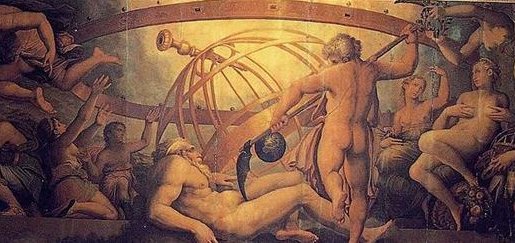 |
|
85 |
MARCH 17 |
18 |
19 (78 = 142 - 64) |
20 (444 = 365 + 79) |
0h (*365) |
|
... Ecclesiastically, the
equinox is reckoned to be on 21
March (even though the equinox
occurs, astronomically speaking,
on 20 March [*364] in most
years) ...
... In view
of the almost universal
prevalence of the Pleiades year
throughout the Polynesian area
it is surprising to find that in
the South Island and certain
parts of the North Island of New
Zealand and in the neighboring
Chatham Islands, the year began
with the new Moon after the
yearly morning rising, not of
the Pleiades, but of the star
Rigel [*78] in Orion
...
|
Counting in the
tresses of Pacha-mama
from right to left: |
|
1 |
26 |
78 |
1 |
29 |
90 |
|
2 |
26 |
2 |
30 |
|
3 |
26 |
3 |
31 |
|
4 |
25 |
104 |
4 |
34 |
124 |
|
5 |
26 |
5 |
31 |
|
6 |
27 |
6 |
30 |
|
7 |
26 |
7 |
29 |
|
Total
= 396 = 182 + 214 (=
364 + 32) |
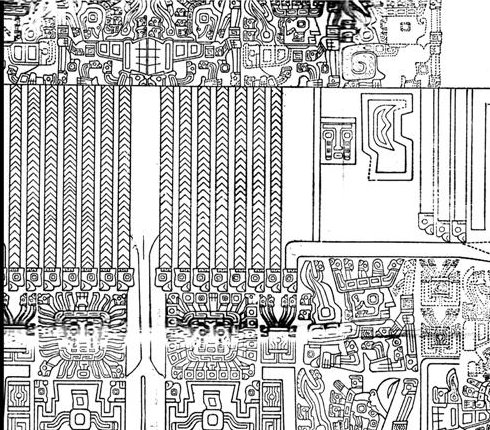
|
 |
 |
 |
 |
 |
|
Gb5-8 |
Gb5-9 |
Gb5-10 (363) |
Gb5-11
(229 + 135) |
Gb5-12 (365) |
|
4h (60.9)
JĪSHUĬ = λ Persei
(60.7)
COR CAROLI (α
Canum Ven.) |
υ Persei (61.2) |
BEID (Egg) = ο╣ Eridani
(62.2),
μ
Persei (62.8)
VINDEMIATRIX ( ε Virginis) |
Al Dabarān-2 (The Follower)
HYADUM I = γ Tauri (63.4)
*22.0 = *63.4 - *41.4 |
HYADUM II = δ╣ Tauri
(64.2) |
|
May 20
(140) |
21 |
22 (54 +
22 * 4) |
23 (*428) |
24 (509) |
|
... Odysseus and his fleet were
now in a mythic realm of
difficult trials and passages,
of which the first was to be the
Land of the Cyclopes, 'neither
nigh at hand, nor yet afar off',
where the one-eyed giant
Polyphemus, son of the god
Poseidon (who, as we know, was
the lord of tides and of the Two
Queens, and the lord,
furthermore, of Medusa), dwelt
with his flocks in a cave. 'Yes,
for he was a monstrous thing and
fashioned marvelously, nor was
he like to any man that lives by
bread, but like a wooded peak of
the towering hills, which stands
out apart and alone from
others.' Odysseus, choosing
twelve men, the best of the
company, left his ships at shore
and sallied to the vast cave. It
was found stocked abundantly
with cheeses, flocks of lambs
and kids penned apart, milk
pails, bowls of whey; and when
the company had entered and was
sitting to wait, expecting
hospitality, the owner came in,
shepherding his flocks. He bore
a grievous weight of dry wood,
which he cast down with a din
inside the cave, so that in fear
all fled to hide. Lifting a
huge doorstone, such as two and
twenty good four-wheeled wains
could not have raised from the
ground, he set this against
the mouth of the cave, sat down,
milked his ewes and goats, and
beneath each placed her young,
after which he kindled a fire
and spied his guests
...
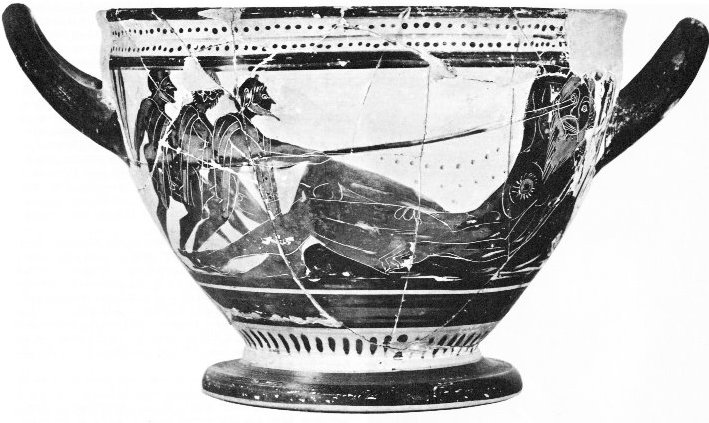 |
|
░May 16 (136) |
17 |
18 |
19 (*424) |
20 (*60) |
|
'April 23 |
24 (114) |
25 (*400) |
26 (*36) |
27 |
|
"April 9 (99) |
10 (465) |
11 |
12 (*22) |
13 |

Similarly, 363 (Gb5-10) - 93 (at the tail of Leo) =
270 = 350 - 80:
|
 |
*93 |
 |
|
Gb2-15 (270) |
Gb5-10 (443 -
80) |
|
SADALMELIK (*334) |
BEID (*62) |
|
Febr
18 (49 = 414) |
May 22 (142) |

|
LUCIA |
DEC
14 (*268) |
15 |
16 (350) |
17 |
 |
 |
 |
 |
 |
|
Gb2-12 |
Gb2-13 |
Gb2-14 (40) |
Gb2-15 (270) |
Gb2-16 |
 |
 |
 |
 |
 |
|
Ga4-1 |
Ga4-2 |
Ga4-3 |
Ga4-4 (270 - 183) |
Ga4-5 (88) |
|
KUH (Weeping) =
μ
Capricorni (331.4),
γ
Gruis (331.5)
*290.0 = *331.4 -
*41.4 |
No star listed (332) |
Piscis Austrini (333.4)
*292.0 = *333.4 -
*41.4 |
22h (334.8)
KAE UH (Roof) = ο Aquarii (334.0), AL KURHAH (White Spot) = ξ Cephei (334.4),
SADALMELIK (Lucky
King) = α Aquarii,
AL DHANAB (The Tail)
= λ Gruis
(334.6), ι Aquarii, ν Pegasi (334.7)
*293.0 = *334.4 -
*41.4 |
ι
Pegasi (335.0),
ALNAIR (The Bright
One) =
α
Gruis
(335.1),
μ
Piscis Austrini,
υ
Piscis Austrini
(335.3),
WOO (Pestle)
=
π
Pegasi
(335.7),
BAHAM =
θ
Pegasi (Good Luck of
the Two Beasts),
τ
Piscis Austrini
(335.8) |
|
Febr 15 |
16 |
17 (413) |
18 (49 = 414) |
19 |
|
... On side B
together with the
four edges is a
series of notches
that are clearly set
in an intentional
pattern. The edges
contain a total of
39 notches in groups
of 6, 13, 7 and 13.
|
Takapau |
39
variants
of uhi -
STOLEN
by Teke
from his
brother
Ma'eha
[E:58-64] |
|
 |
18 |
 |
13 |
 |
7 |
 |
|
SIRRA H
(*0) |
ADHIL
(*19) |
MIRA
(*33) |
BHARANI
(*41) |
|
ALCHITA
(*183) |
SPICA
(*202) |
KHAMBALIA
(*216) |
ZUBEN
ELGENUBI
(*224) |
|
0h |
39 (= 3
* 13) |
A
further 49
notches on side
B are
arranged in four
vertical lines
of 13, 10, 12
and 13
respectively
plus a further
notch that could
be in either of
the middle two
lines ... The
grouping of the
notches on the
plate suggests a
time-related
sequence. The
total number of
notches (88) not
only coincides
with the number
of days in 3
lunations (88.5)
but also
approximately
with the number
of days when the
star Betelgeuse
(α
Ori) disappeared
from view each
year between its
heliacal set
(about 14 days
before the
spring equinox
around 33,000
BP) and its
heliacal rise
(approximately
19 days before
the summer
solstice)
...
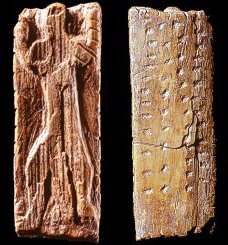
|
|
░Febr 11 |
12 (408) |
13 |
2-14 |
15 (46) |
|
'Jan 19 (384) |
20 |
21 |
22 |
23 (*308) |
|
"Jan 5 |
6 |
7 (372) |
8 (*293) |
9 |
|
CLOSE TO THE FULL
MOON: |
|
JUNE 13 (*84) |
14 |
15 |
16 |
17 (168) |
|
υ╣
Hydrae (148.4), RAS
ELASET BOREALIS
(Northern Head of
the Lion) =
μ
Leonis
(148.7)
*107.0 = *148.4 -
*41.4 |
TSEEN KE (Heaven's
Record)
=
φ
Velorum
(149.9) |
ν Leonis (150.1), π
Leonis (150.6) |
υ▓ Hydrae (151.8) |
Al Jabhah-8
(Forehead) /
Maghā-10 (Bountiful)
/
Sharru-14 (King)
10h (152.2)
AL JABHAH =
η
Leonis (152.4),
REGULUS (Little
KIng) =
α
Leonis
(152.7)
*111.0 = *152.4 -
*41.4 |
|
Aug 16 (*148) |
17 |
18 (230) |
19 |
20 |
|
░Aug 12 |
13 (225) |
14 |
15 |
16 (*148) |
|
'July 20 (*121) |
21 |
22-7 |
23 (204) |
24 |
|
"July 6 (*107) |
7 |
8 |
9 (190) |
10 |
And then 275 (Gb2-20) - 41
(Ga2-11) = 234 = 18 * 13 = 468 /
2:
|
DEC 18 |
19 (*273) |
20 (354) |
SOLSTICE
(*275) |
85 |
 |
 |
 |
 |
|
Gb2-17
(272 = 2 * 136 |
Gb2-18 |
Gb2-19 |
Gb2-20 (229
+ 46) |
|
... Allen has
documented all his star culminations
at 21h, which could be due to an
effort of keeping the culminations
at their proper places according to
the ancients, 24h (spring equinox) -
21h = 3h = 24h / 8 = 45║. 3h
corresponds to 366 / 8 = 45.75 of my
right ascension days and *366 - *46
= *320 (Dramasa, σ
Octantis) ... |
|
ζ
Cephei (336.2),
λ
Cephei (336.3), -/270 Lac.
(336.7), λ Piscis Austrini (336.8) |
μ
Gruis (337.0),
ε
Cephei (337.2), 1/325 Lac. (337.3),
ANCHA (Hip) =
θ
Aquarii (337.4),
ψ
Oct.
(337.5), α Tucanae (337.9)
*296.0 = *337.4 - *41.4
*337.4 = *169.4 (Coxa, the Hip in
Leo) + *168 |
Al Sa'ad al Ahbiyah-23 (Lucky Star
of Hidden Things) /
Shatabisha-25 (Comprising a Hundred
Physicians)
ε
Oct. (338.1),
ρ
Aquarii
(338.2), 2/365 Lac. (338.5),
SADACHBIA =
γ
Aquarii
(338.6),
π
Gruis (338.9) |
β/172
Lac. (339.2),
4/1100 Lac. (339.4),
π
Aquarii (339.5)
*298.0 = *339.4 - *41.4
CASTOR (α Gemini) |
|
Febr 20 (*336) |
21 (52) |
22 (418) |
Terminalia |
|
... The leap day was introduced as
part of the Julian reform. The day
following the Terminalia (February
23) was doubled, forming the 'bis
sextum - literally 'double
sixth', since February 24 was 'the
sixth day before the Kalends of
March' using Roman inclusive
counting (March 1 was the 'first
day').
Although exceptions exist, the first
day of the bis sextum
(February 24) was usually regarded
as the intercalated or 'bissextile'
day since the third century.
February 29 came to be regarded as
the leap day when the Roman system
of numbering days was replaced by
sequential numbering in the late
Middle Ages ...
|
 |
|
Gb2-21 |
|
|
░Febr 16 (*332) |
17 (48) |
18 (414→ Bharani) |
19 |
|
'Jan 24 |
25 (*310) |
26 |
27 (392) |
|
"Jan 10 (*295) |
11 |
12 |
13 (378
→ Saturn) |
|
... The divine names Bran,
Saturn, Cronos ... are applied to the ghost of
Hercules that floats off in the alder-wood boat
after his
midsummer sacrifice. His
tanist, or other self, appearing in Greek legend
as Poeas who lighted Hercules' pyre and
inherited his arrows, succeeds him for the
second half of the year; having acquired royal
virtue by marriage with the queen, the
representative of the White Goddess, and by
eating some royal part of the dead man's body -
heart, shoulder or thigh-flesh. He is in turn
succeeded by the New Year Hercules, a
reincarnation of the murdered man, who beheads
him and, apparently, eats his head. This
alternate eucharistic sacrifice made royalty
continous, each king in turn the Sun-god beloved
of the reigning Moon-goddess. But when these
cannibalistic rites were abandoned and the
system was gradually modified until a single
king reigned for a term of years,
Saturn-Cronos-Bran became a mere Old Year ghost,
permanently overthrown by Juppiter-Zeus-Belin
though yearly conjured up for placation at the
Saturnalia or Yule feast ...
... That Cronos
the emasculator was deposed by his
son Zeus is an economical statement:
the Achaean herdsmen who on their
arrival in Northern Greece had
identified their Sky-god with the
local oak-hero gained ascendancy
over the Pelasgian agriculturalists.
But there was a compromise between
the two cults. DionŰ, or Diana, of
the woodland was identified with
DanaŰ of the barley; and that an
inconvenient golden sickle, not a
bill-hook of flint or obsidian, was
later used by the Gallic Druids for
lopping the mistletoe, proves that
the oak-ritual had been combined
with that of the barley-king whom
the Goddess DanaŰ, or Alphito, or
Demeter, or Ceres, reaped with her
moon-shaped sickle. Reaping meant
castration; similarly, the Galla
warriors of Abyssinia carry a
miniature sickle into battle for
castrating their enemies ...
 |
|
MARCH 17 |
18 |
19 (78 = 142 - 64) |
(444 = 365 + 79) |
0h (*365) |
99 |
 |
 |
 |
 |
 |
|
Gb5-8 (361) |
Gb5-9 |
Gb5-10 (275 + 88) |
Gb5-11
(135) |
Gb5-12 (365) |
|
4h (60.9)
JĪSHUĬ = λ Persei
(60.7)
COR CAROLI (α
Canum Ven.) |
υ Persei (61.2) |
BEID (Egg) = ο╣ Eridani
(62.2),
μ
Persei (62.8)
VINDEMIATRIX ( ε Virginis) |
Al Dabarān-2 (The Follower)
HYADUM I = γ Tauri (63.4)
*22.0 = *63.4 - *41.4 |
HYADUM II = δ╣ Tauri
(64.2) |
|
May 20 |
21 |
22 (142) |
23 (*428) |
24 (509) |
|
░May 16 (136) |
17 |
18 |
19 (*424) |
20 (*60) |
|
'April 23 |
24 (114) |
25 (*400) |
26 (*36) |
27 |
|
"April 9 (99) |
10 (465) |
11 |
12 (*22) |
13 |
|
3-14 (73) |
MARCH 15 |
16 (440) |
17 |
18 |
19 (443) |
20 (*364) |
 |
 |
 |
 |
 |
 |
 |
|
Gb8-24 (236) |
Gb8-25 |
Gb8-26 |
(361 + 107) |
Gb8-28 |
Gb8-29 |
Gb8-30 (242) |
|
MENKHIB (Next to the
Pleiades =
ζ
Persei
(57.6)
PORRIMA (γ
Virginis) |
ZAURAK (Boat) = γ Eridani
(58.9) |
λ Tauri (59.3), ν Tauri
(59.9) |
4h (60.9)
JĪSHUĬ = λ Persei
(60.7)
COR CAROLI (α
Canum Ven.) |
υ Persei (61.2) |
BEID (Egg) = ο╣ Eridani
(62.2),
μ
Persei (62.8)
VINDEMIATRIX ( ε Virginis) |
Al Dabarān-2 (The Follower)
HYADUM I = γ Tauri (63.4)
*22.0 = *63.4 - *41.4 |
|
May 17 (137) |
18
(*58) |
19 (*424) |
20 |
21 |
22 |
23 (*428) |
|
░May 13 |
14 (*54) |
15 (*420) |
16 (136) |
17 |
18
(*58) |
19 (*424) |
|
'April 20 |
21 (111) |
22 |
23 |
24 |
25
(*400) |
26 (*36) |
|
"April 6 |
7 |
8 |
9 (464) |
10 (100) |
11 |
12 (*22) |
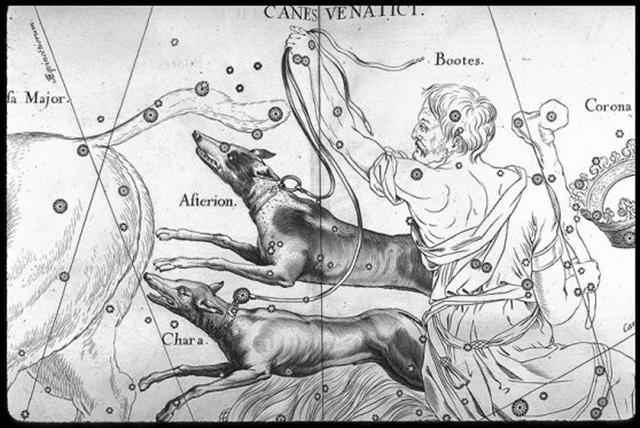
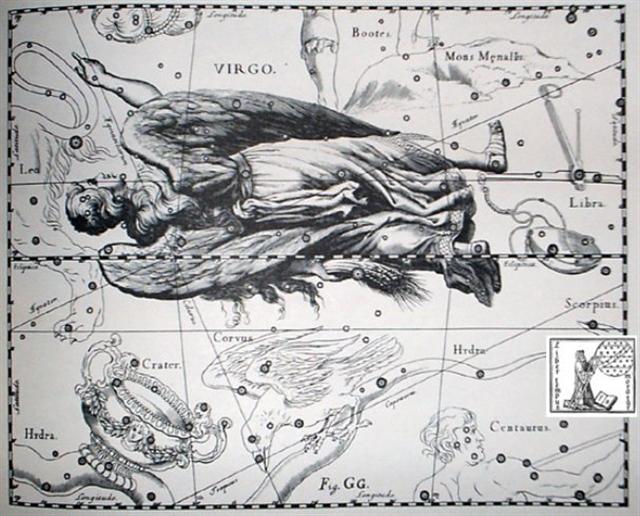
|
 |
*93 |
 |
 |
|
Gb2-15 (270) |
Gb5-10 (443 -
80) |
Gb8-30 (3 / 2 * 314) |
|
SADALMELIK (*334) |
BEID (*62) |
HYADUM I (*63) |
|
Febr
18 (49 = 414) |
May 22 (142) |
23 (*428) |
 |
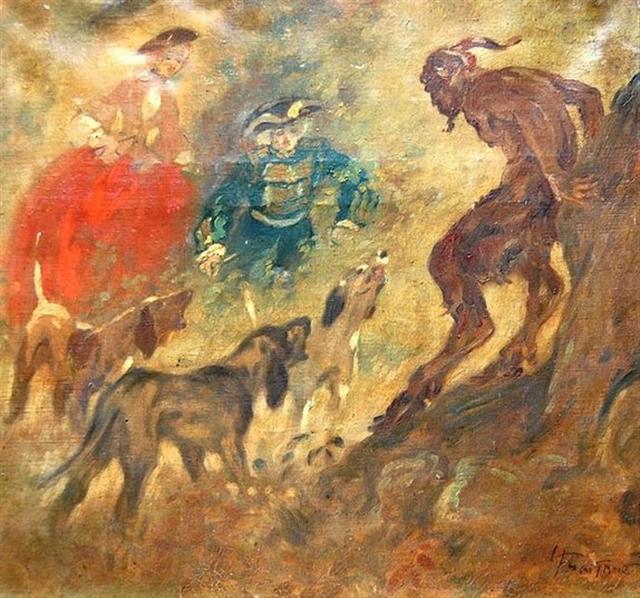
|



















